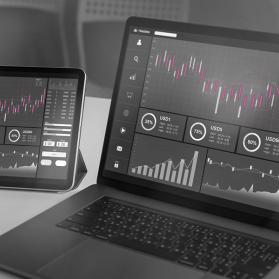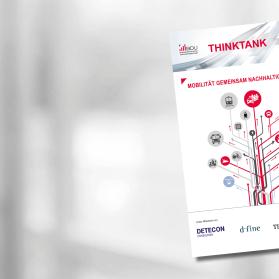Sharing data must be rewarded. Article #8 in our Smart Mobility series looks at the question of the extent to which customers in the mobility context can be motivated to share their data through reward incentives. This starts by looking at the necessity and relevance of data availability. Examples and best practices within the mobility industry will show how rewarding customers for sharing their data is already taking shape today. It is clear that customers, regardless of the industry, expect added value when they share their data. In a mobility ecosystem, a holistic reward system must be developed and built along the "customer journey" so that Smart Mobility can be successful.
Access to data is the central challenge
The international Detecon study on Smart Mobility (Preview Studie) has highlighted the relevance of data for the future of mobility through intensive, qualitative interviews with more than 20 representatives of well-known companies in the mobility industry and a market survey of more than 300 mobility experts.
The central challenge facing mobility industry players is how to ensure access to relevant mobility data, especially that of end customers. One possible solution may be to reward data sharing in a mobility ecosystem and thus create a vested interest in sharing data. The overwhelming majority of over 70 percent of respondents agreed with this thesis, stating "The collection, evaluation and sharing of data must be rewarded for Smart Mobility to be successful", at least in tendency or even unreservedly. How can it be done?
Potential benefits of sharing data: Customers opt for this for a variety of reasons
Government regulations are also increasingly playing a role in this field - such as the Real Time Monitoring (RTM) of e-vehicles in China. Here, the added value for the customer is that he is allowed to register an e-vehicle and operate it in public road traffic. In an interviewwith Detecon, mobility expert Alexander Gottwick talks about the topic of RTM in China and points out essential points of an RTM strategy for European and non-European automobile manufacturers.
As numerous as the programs for collecting customer data are, the rewards for customers for sharing their data are just as varied. Traditional customer loyalty programs in the consumer goods industry are a large area. Customers disclose their personal data and purchase information and receive a range of benefits in return. On the one hand, in the form of points systems - financial or material rewards (see Payback). On the other hand, some programs reward through non-material values such as with membership in an exclusive customer circle (e.g., the "Insider Programm“ from Anson’s) or through exclusive benefits (e.g., invitations to exclusive events).
The experts in the Detecon study on Smart Mobility confirm that customers expect a reward for sharing data and in some cases even decidedly "economic benefits". If the corresponding added value is offered, they are willing to share their mobility data. However, it is very difficult to determine the exact necessary "size" of this added value. Individual customer preferences and cultural imprints also play a major role (Statista 1, Statista 2 p.35). In general, it can often be observed that even a relatively small added value for the customer is sufficient to convince him to share his data.
How to develop the best possible reward system?
One possible approach to identifying the optimal reward is offered by the marketing tools from the field of customer experience management. In particular, customer journey and touchpoint analyses are worth mentioning here. In terms of a completely customer-centric approach, a customer journey analysis maps and analyzes the entire "journey" of a customer in connection with the company's product/service. The touchpoint analysis defines essential touchpoints of the customer with the company and the influence on the customer journey. An analysis of these touchpoints can give rise to creative, novel and, above all, customer-centric reward systems with regard to reward potential.
In addition to the customers, the companies in a mobility ecosystem must of course also derive added value from the collection and analysis of customer data. In this case, too, measuring the respective added value is difficult and usually cannot be described in general terms. To gain a more concrete insight here, it is very helpful to take a closer look at use cases already available from the mobility industry.
Data use and reward in mobility: Several concrete use cases already exist
Competing local mobility providers are still very skeptical in some cases about sharing data in the form of cooperation with intermodal platforms. The benefits of participation are therefore either not yet great enough for these mobility providers or competitive tactical considerations play an overriding role.
Furthermore, the first platforms for intermodal mobility in Germany (e.g., Moovel, Jelbi) do not yet rely on large-scale data analysis. They collect data anonymously to improve the customer experience - but not to make individual offers to customers and provide personalized added value. However, this is already different in other areas of the mobility industry.
If you look at the automotive industry, you can quickly find approaches where exactly such ideas are being pursued: In the future, Jaguar wants to reward drivers who share their data in the form of a credit of the cryptocurrency IOTA to the vehicle's own smart wallet. The credit can then be used, for example, to charge at a charging station or to pay parking fees. Jaguar itself can learn more about the behavior of its customers through this program and get one step closer to its goal of zero emissions, zero accidents and zero congestion.
Daimler and Co rely on gamified data collection
Another way to reward customers for sharing their data is the gamification approach: manufacturers such as Daimler and Toyota are already testing this model. Daimler is considering introducing its own cryptocurrency (Mobicoin) here. In particular, environmentally friendly and safe driving behavior will be rewarded through Mobicoin credits. Toyota is integrating this approach into its "Kinto" leasing offer. Here, too, customers can collect points depending on their driving style and exchange them for rewards. Similar to Daimler, DKV's "Eco Trucker“ app" offers users the opportunity to collect points for environmentally friendly driving behavior via a gamification approach. This enables freight forwarders to reduce their operating costs while at the same time increasing driver motivation via a bonus system.
In addition to the gamification approach, there are many other examples around the automotive industry of how customers can be rewarded for sharing their data: ByMilesoffers dynamic pricing of insurance policies based on telematics data, DOVUis a blockchain-based platform on which customer data can be shared in exchange for rewards, and Synaptivspecializes in collecting and processing connected car data for OEMs, for example.
So in the future of mobility - as in many other industries - "Data is King!" Companies will have to deal with data-related reward systems, among other things, when designing a mobility ecosystem. After all, regulatory measures on data protection also require that customers be motivated to share their data voluntarily and proactively.







